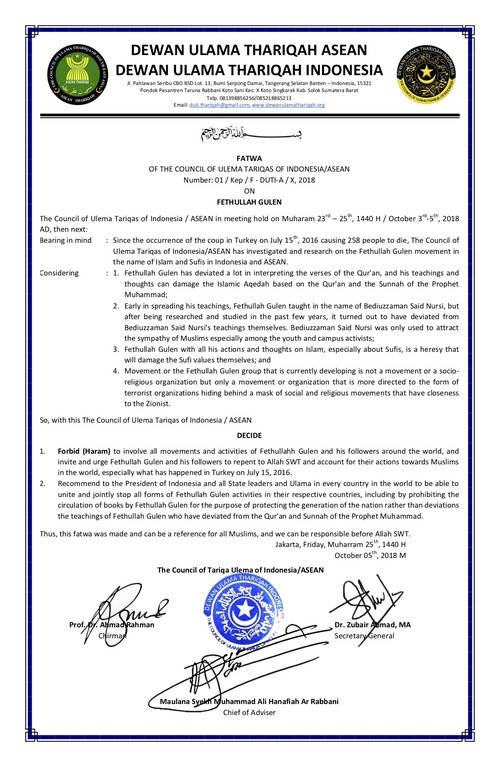It is forbidden (haram) to be involved in all the movements and activities of the Gülenist Terror Group (FETÖ) leader Fetullah Gülen and his followers around the world, the Council of Ulema Tariqas of Indonesia said in a fatwa on Friday, calling on all Muslims and heads of state of Islamic countries to unite against them.
"We invite and urge Fetullah Gülen and his followers to repent to Allah SWT and account for their actions towards Muslims in the world, especially what has happened in Turkey on July 15, 2016," the fatwa said in reference to the bloody coup attempt perpetrated by the group.

Stating that Gülen, who has lived in the U.S. since 1999 in self-imposed exile, has distorted the meanings of Quranic verses and the teachings of Prophet Mohammed (Peace Be Upon Him), the country's top Muslim clerical body said that the FETÖ leader also deviated from Republican era scholar Said Nursi's teachings.
"Fetullah Gülen has deviated a lot in interpreting the verses of the Qur'an, and his teachings and thoughts can damage the Islamic Aqedah based on the Qur'an and the Sunnah of the Prophet Muhammad," the fatwa said, adding "Early in spreading his teachings, Fetullah Gülen taught in the name of Bediuzzaman Said Nursi, but after being researched and studied in the past few years, it turned out to have deviated from Bediuzzaman Said Nursi's teachings themselves."
Regarding Gülen's use of Said Nursi's legacy, the council said that the terrorist leader only tried to "attract the sympathy of Muslims especially among the youth and campus activists."
"Fetullah Gülen with all his actions and thoughts on Islam, especially about Sufis, is a heresy that will damage the Sufi values themselves."
Underscoring that the FETÖ is not just a movement or a socio-religious organization, the council further reiterated that it is indeed "more directed to the form of terrorist organizations hiding behind a mask of social and religious movements that have closeness to the Zionists."
In the verdict of the fatwa, the council voiced the call on Gülen and his followers to "repent to Allah SWT and account for their actions towards Muslims in the world."
Recommending to the President of Indonesia, all heads of state in Islamic countries and Muslim scholars in every country in the world "to be able to unite and jointly stop all forms of Fetullah Gülen activities in their respective countries, including by prohibiting the circulation of books by Fetullah Gülen," the body said these measures were important to protect the people from Gülen's distortion of Islamic teachings.
The FETÖ, a criminal enterprise founded by fugitive Fetullah Gülen, has been directly implicated in the December 2013 judicial coup attempt and the July 15, 2016 military coup attempt against the democratically elected government of Turkey.
With its media and business arms, the terrorist group created significant public clout, which was augmented by infiltration in state institutions, principally the judiciary, police and military. Many of its most senior members fled abroad on the eve or soon after the coup attempt in 2016.
Dating back to the 1960s, the FETÖ was the brainchild of Gülen who served as a primary school educated imam before founding the group, which has always acted as a secretive cult.
The 1970s and 1980s were spent consolidating the group, creating the necessary education and financial structure, while slowly infiltrating state institutions. Its schools and prep schools served as the main recruiting ground for the group, which assigned particular degrees and vocations to its members.
Its leadership hierarchy was hidden from the public, apart from Gülen himself. The FETÖ, like many terrorist groups, created a structure based on individual cells within various state organizations, like the judiciary, police and military.
Cells of various sizes were each organized around an imam, often an academic or police officer. It was normal practice for FETÖ member generals, prosecutors and judges to receive orders from an academic or teacher. Group hierarchy always trumped civilian hierarchy.
Over the years, the FETÖ transformed into a behemoth, with finance, business, education and media arms spread across the globe. It has charter schools in the U.S., mainly used to collect and siphon federal funds for various FETÖ projects, while its schools in the rest of the world are usually used for recruiting.
Gülen is viewed as a sort of messiah by his followers, according to former members.